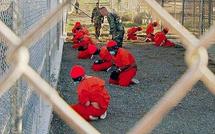
The documents were filed in a case involving alleged Al-Qaeda member Ramzi Binalshibh, whose lawyer is seeking a court order halting all military commission proceedings at Guantanamo.
US Justice Department lawyers rejected the need for an indefinite freeze on proceedings, but said they would soon file a motion requesting a 60-day delay in the case, scheduled to resume at the naval base facility next week.
"This motion will be based on impending changes... and upcoming decisions by the attorney general in consultation with the secretary of defense concerning the forum in which these cases will be prosecuted," wrote Assistant Attorney General David Kris.
"Within 60 days... a decision might be made to prosecute the petitioner in federal court," the filing added.
The motion, which was not yet available, will be filed before the military judge overseeing the case against the five accused, who include the self-described mastermind of the attacks, Khalid Sheikh Mohammed.
The documents filed Wednesday added that lawmakers from the Senate and House of Representatives "are expected to meet in late September or early October" to consider reformation of the Military Commissions Act that governs the prosecution of detainees at Guantanamo.
Kris said the Justice and Defense Departments have established a protocol for deciding whether Guantanamo Bay detainees should be prosecuted, and whether they should be tried before civilian or military courts.
"Teams of prosecutors from the two departments are now reviewing the cases and will be making recommendations shortly," the filing said.
The administration has made closing Guantanamo by January 2010 a key priority, but has faced difficulty deciding how to deal with about 226 detainees still held at the base.
Since President Barack Obama took office, 14 detainees have been repatriated or given asylum by third countries.
But the administration has yet to announce how many of those left over will be prosecuted before military courts, how many will be tried in civilian courts, and how many will be held indefinitely without a trial.
--------------------------------------------------------------------------------------------------------------------------
US Justice Department lawyers rejected the need for an indefinite freeze on proceedings, but said they would soon file a motion requesting a 60-day delay in the case, scheduled to resume at the naval base facility next week.
"This motion will be based on impending changes... and upcoming decisions by the attorney general in consultation with the secretary of defense concerning the forum in which these cases will be prosecuted," wrote Assistant Attorney General David Kris.
"Within 60 days... a decision might be made to prosecute the petitioner in federal court," the filing added.
The motion, which was not yet available, will be filed before the military judge overseeing the case against the five accused, who include the self-described mastermind of the attacks, Khalid Sheikh Mohammed.
The documents filed Wednesday added that lawmakers from the Senate and House of Representatives "are expected to meet in late September or early October" to consider reformation of the Military Commissions Act that governs the prosecution of detainees at Guantanamo.
Kris said the Justice and Defense Departments have established a protocol for deciding whether Guantanamo Bay detainees should be prosecuted, and whether they should be tried before civilian or military courts.
"Teams of prosecutors from the two departments are now reviewing the cases and will be making recommendations shortly," the filing said.
The administration has made closing Guantanamo by January 2010 a key priority, but has faced difficulty deciding how to deal with about 226 detainees still held at the base.
Since President Barack Obama took office, 14 detainees have been repatriated or given asylum by third countries.
But the administration has yet to announce how many of those left over will be prosecuted before military courts, how many will be tried in civilian courts, and how many will be held indefinitely without a trial.
--------------------------------------------------------------------------------------------------------------------------









 Home
Home Politics
Politics









